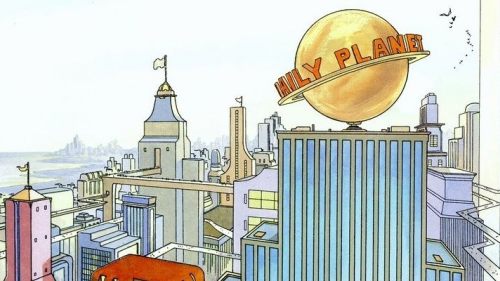Moroder And METROPOLIS
I’m not sure if it’s weirder to think about before or after you’ve seen it, but Giorgio Moroder’s Metropolis is one of the most bizarre cinematic experiences ever created. 57 years after Fritz Lang’s groundbreaking 1927 science fiction film was originally released in Germany, the Italian composer and music producer assembled a cross-section of chart-topping artists and created a “new” version of the film that changed frame rates, reworked intertitles, added color tinting and basically gave it an electronic face lift. But in the wake of his recent collaboration with Daft Punk on their new album, Random Access Memories, not to mention a watershed moment in the history of film preservation and restoration, it seems like a good time to dig into its unwieldy but irresistible charms.
Given how unusual Moroder’s version is as a viewing experience, it’s more remarkable than ever that it took another 18 years – the film’s 75th anniversary – to produce a more complete version of the film. In addition to producing a soundtrack featuring the likes of Pat Benatar, Freddie Mercury, Jon Anderson, Loverboy and Bonnie Tyler, Moroder scoured film archives for three years in an effort to find all available film elements, and then restored it with the help of Daniel Woodruff. Amazingly, Moroder’s score perfectly suits the film’s uneasy balance between humanity and technology, especially in hindsight, where several of the songs feel wildly out of place – not to mention corny as hell – even as Moroder’s pulsing score adds a propulsive energy to its mechanical backdrop.
But more than simply entertaining its audience, or celebrating a bona fide classic in a new way, the film evidences Moroder’s ability to combine, transform and conquer any art form to which he applied his creativity. After a moderately successful career as a singer in the late 1960s, he actively embraced the advancing wave of technological innovation in the ‘70s that enabled pop music to truly evolve, while simultaneously introducing its range of new arrangements and textures to film composition. Within a year of producing Donna Summer’s 1977 smash “I Feel Love,” the first disco song produced exclusively with synthesizers, Moroder released his benchmark solo album From Here To Eternity and netted himself an Academy Award for the score to Midnight Express. By the time he released Metropolis in 1984, he’d earned another Oscar (for Irene Cara’s Flashdance anthem “What A Feeling”) and completed the now-iconic soundtracks for American Gigolo, Cat People and Scarface.
Ultimately, however, Moroder’s gift was not to use technology as a substitute for human performance, but to enhance and deepen it; the echoing vistas of his backing track for “I Feel Love” would have none of their sweep without the haunting romanticism of Summer’s vocals. Similarly, Metropolis’ optimistic protagonist Freder seems super-powered in his inspiration when paired with the sinister throbbing of “Machines,” Moroder’s companion piece for the oppressive machine rooms where the underclasses struggle for survival. Of course, it’s much more commonplace these days to combine live performance with electronic instrumentation, or even to make the latter sound indistinguishable from the former. But even if the most jarring anachronism in the film is Bonnie Tyler’s catastrophically vampy theme for Freder’s love interest, Maria, entitled “Here She Comes,” Giorgio Moroder’s Metropolis achieves a unique, amazingly timeless watchability, precisely because it was cobbled together from so many seemingly ephemeral parts.
Moroder's Metropolis plays at the Alamo Drafthouse Village in Austin tomorrow, July 17. Get tickets here.



